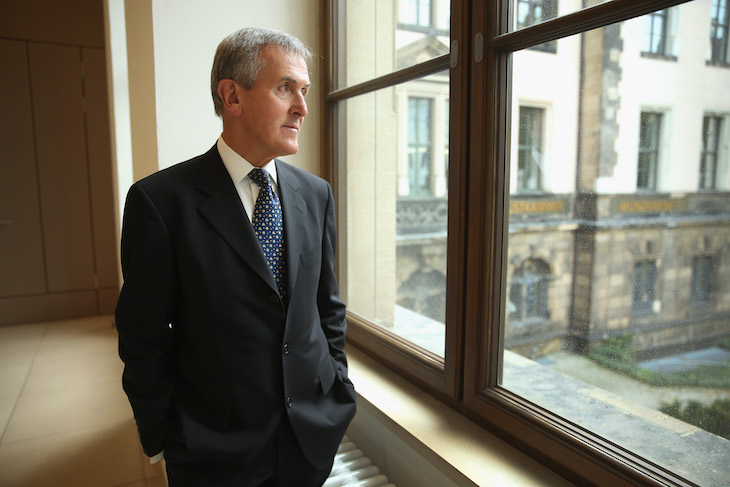Only Neil MacGregor could do it — take us in a single thread from a blackened copper coin, about the size of a 10p piece, dating from Rome in about 200 AD, to a packed music hall in London during the first world war. In his new 30-part series for Radio 4, Living with the Gods, the former director of the British Museum looks at the ways in which societies come together through shared rituals and beliefs and how these rituals are developed and used to make sense of our place in a universe beyond human comprehension. One side of the coin shows a fire burning within the Temple of Vesta, dedicated to the Roman goddess of fire, and surrounded by the Vestal Virgins, whose job it was to keep the flames alight, to protect the ‘hearth’, or the focus of Rome’s power. On the other side, a portrait not of the emperor but of his consort Empress Julia Domna.
In a rare example of women exercising their power outside the home, Rome’s future was dependent on the fire-preserving abilities of these virgins. If the fire did go out, it was thought that something bad would happen to Rome; and the virgins deemed responsible were buried alive. It’s that history, MacGregor argues persuasively, via Elizabeth I’s portrait as a Vestal Virgin and that of Marie Antoinette, too, which led to Ivor Novello’s popular song, ‘Keep the Home Fires Burning’. The hearth was the seat of domestic security, kept burning by the women of the house, and Novello, you could say, was harking back to the Vestal Virgins as he attempted to boost morale in 1914.
In another thread in the same programme we were given a Persian coin, this time of shiny gold, and from 275 AD. A picture of holy fire, the flames guarded by two armed men, is complemented on the other side by a portrait of the shah, with flowing locks, crown and diadem. Political and religious power meet and merge in a flame, explains MacGregor, just like the perpetual flame that burns beneath the Arc de Triomphe in Paris, alight since 1923 as a memorial to those soldiers killed in the war and a permanent symbol of nationhood. It’s these leaps and connections that make MacGregor’s radio series (produced by Paul Kobrak) so exhilarating: so many ideas, so much concrete knowledge. Through brilliantly concise script-writing and a carefully chosen panel of experts, he makes us believe that we might be just as clever too, able to synthesise disparate areas of knowledge and make sense of them in our own lives.
As MacGregor told Andrew Marr on Start the Week on Monday morning (Radio 4), we are living in an unusual period historically, in a country with an established church on the wane and where no single story (religious or otherwise) binds us together with a coherent view of how we fit into the bigger picture of time and space. In this latest series, he gives us the tools to think about what this might mean.
Radio 3’s slow radio series continues this week with a late-night five-parter, Meditations from a Monastery (produced by Tony Sellors, in conjunction with the BBC4 series). This was really slow, the minutes dragged out in a most disconcerting way, thoughts stilled, very little to take in except the sound of birdsong, plainsong and the occasional gnomic sentences of an unnamed monk-narrator. It was, though, remarkably cleansing; how to declutter on air.
‘You need to try to put the whirlpool of whirling thoughts aside and be still before God,’ we were told. Then several seconds of silence, or rather blank space on air. ‘You have to work at silence.’ Almost impossible to do while within the world. But in just 13 minutes 23 seconds, the second hand did appear to slow down, time and space lengthened out before me. ‘It’s heaven,’ whispered the narrator in his monastic retreat.
In Nigeria: Shooting it Like a Woman on the World Service (produced by Mukti Jain Campion and Nadia Denton) we met the formidable Mildred Okwo, a US-trained lawyer who went back to Lagos and began making films in ‘Nollywood’, the largest centre of film-making in Africa. She was tired of watching films from her country where the women characters bore very little resemblance to her own life. ‘You could just tell it was men writing these stories. Yes, women were acting in them, but they didn’t have a voice.’ Her film The Meeting deliberately sets out to overturn expectations of what a woman director might make by setting the story in the world of government offices. Her characters cheat and bully people, misuse their authority. Yes, that’s you behaving badly, she wanted to tell the government.
‘Telling good stories that can empower the people is very important to our survival,’ says Okwo, whose voice, deep and measured, conveyed a character strong enough to dominate any scene. ‘I know my film craft,’ she said, ‘so there was no chance for them [her male colleagues on set] to say, “She’s just a woman.” I know more than they do.’ You just knew she was right.






Comments